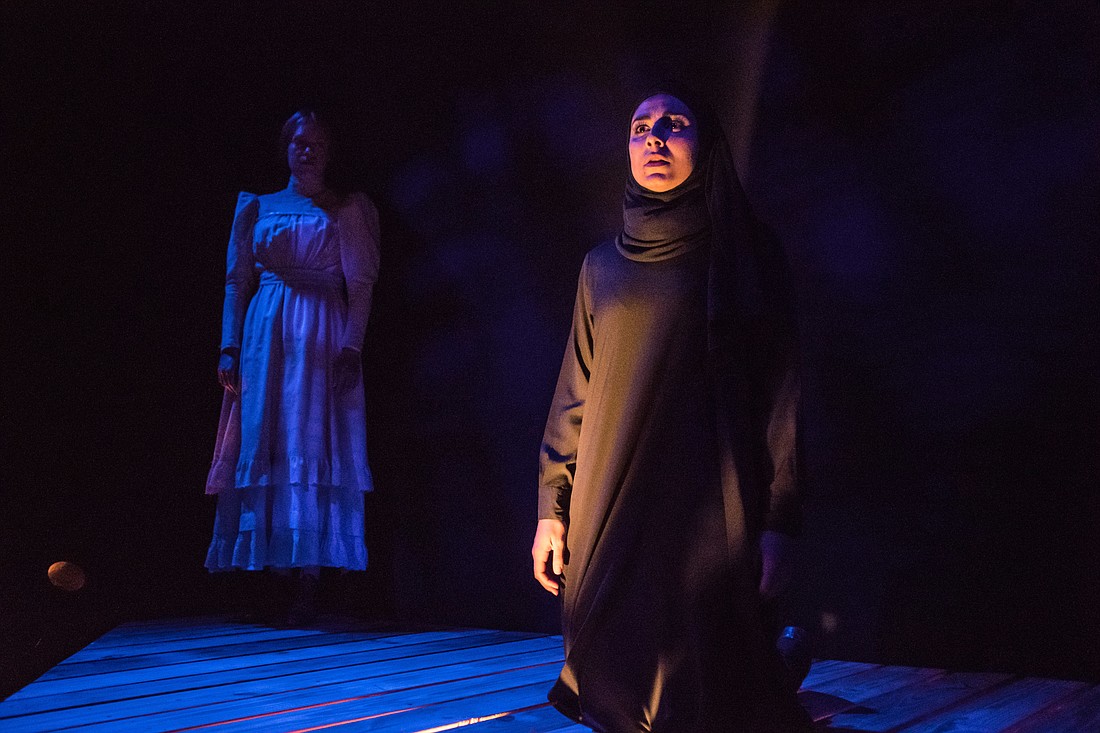- April 26, 2025
-
-
Loading

Loading

Henry Naylor’s “Echoes” puts a double focus on two women under the thumb of male dominance in the latest Urbanite production. Their stories weave in and out of each other and unfold 175 years apart.
In 1840, the British Empire offered free passage to India to unmarried young women willing to marry the Empire’s lonely bachelors. Tillie (Kate Berg), a brainy, ebullient, 19-year-old from Ipswich, England, agrees to the trip, and winds up with a dashing lieutenant en route to Afghanistan. They marry. When she objects to his cruelty to the “natives,” he slaps her down. Tillie’s job is to have children and keep her mouth shut.
In 2015, a young Muslim woman named Samira (Mari Vial-Golden) is living with her mother, also in Ipswich, England. Samira feels marginalized and resents the media’s focus on salacious celebrities while countless Syrian refugees suffer. Thanks to her bitterness, she falls for a friend’s sales pitch for the ISIS lifestyle. After a few Skype calls and a plane flight, Samira winds up in ISIS-held territory as one of a jihadist’s many wives. He beats her regularly — in his spare time between beheading neighbors and blowing up ancient mosques.
Naylor writes at a very high level. His short, sharp script offers a series of grim scenes, punctuated with gallows humor.
It’s a gimmick-free play, and it's a heavy play. The bulk of the weight is on the shoulders of the two actors alone.
Berg and Vial-Golden carry that weight with honesty and grace. In addition to Tillie and Samira, they bring a large cast of unseen characters to life using only voice characterization and body language. They also pepper their monologs with screenplay-like descriptions of their worlds. The effect is like watching a movie of the mind, cutting back and forth between two parallel stories. Their performances shine.
Director Brendan Ragan matches Naylor’s economical writing with a spare, no-nonsense approach. He lets the women give their first-person narratives without implied editorializing.
Except for a cluster of hanging light bulbs, the Urbanite stage is bare of props or staging. Kudos to Ryan E. Finzelber for the dreamlike, minimalist lighting and staging and Alison Gensmer for the realistic, unromantic costumes.
Berg and Vial-Golden evoke the lives of two women who’ve been sold a bill of goods—and then wind up stripped of dignity and power, and full of buyer’s remorse. Each becomes the loser in a zero-sum game—a glorified slave in a male-dominated power structure. Each has a narrow job description: Shut up, have kids, support your husband and do whatever he says.
Both women start out wide-eyed and naïve. They think it’s the beginning of a grand adventure. Grim reality quickly disillusions them. But they don’t fold. Once the women’s eyes are opened, they both find a way to fight back. They don’t live happily ever after. But they both end their stories on their own terms.
The women’s journey to that apotheosis is powerful and never comfortable. Tillie and Samira stand for oppressed women across the centuries. Silenced women, usually. Naylor’s play gives them a voice. A cry of pain and anger that boils down to, “I exist, whether you like it or not.”
The characters get under your skin and into your head. They stay with you after the play. And the next time you watch the bloody scenes on Fox or CNN.
You can’t help wondering about all the women the camera never sees.